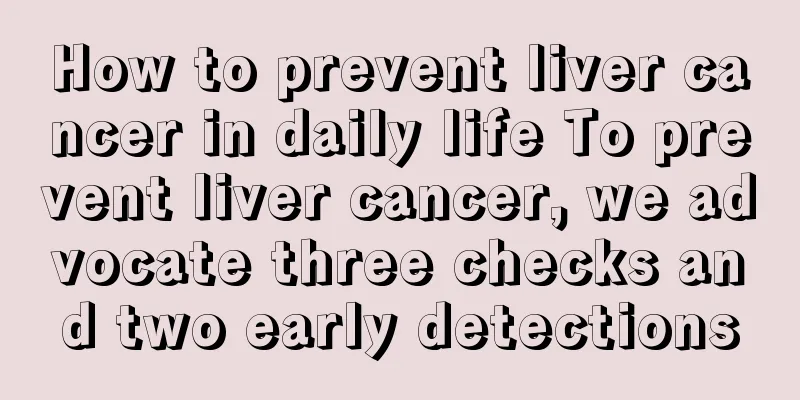How to prevent liver cancer in daily life To prevent liver cancer, we advocate three checks and two early detections

|
About 110,000 people die of liver cancer in my country each year, accounting for 45% of the world's liver cancer deaths. The long-term effect of early resection of liver cancer in the subclinical stage can be particularly significant, thanks to the monitoring of high-risk groups by serum alpha-fetoprotein (AFp) detection combined with ultrasound imaging. In addition, active comprehensive treatment has significantly improved the five-year survival rate of liver cancer. Therefore, for the prevention of liver cancer, we advocate three checks and two early detection. The three checks refer to the three-level census management. According to the risk level of liver cancer, people prone to liver cancer are generally divided into three categories: the first category is the high-risk group, such as patients who develop cirrhosis due to chronic viral hepatitis (hepatitis B or hepatitis C). The second category is the moderate-risk group, such as patients with chronic viral hepatitis, but without a family history of cirrhosis and liver cancer. The third category is the low-risk group, such as patients with non-viral causes of cirrhosis. The three-level census is to conduct different examinations according to the three groups of people. Generally, high-risk groups undergo relevant examinations (liver function, alpha-fetoprotein and ultrasound) every 3 months, moderate-risk groups undergo examinations at least once every six months, and low-risk groups undergo relevant examinations once a year. When suspicious cases are found, CT, magnetic resonance imaging or arterial angiography should be further performed until liver cancer is ruled out. Two early means early prevention and early diagnosis. Clinical practice has shown that the treatment effects of small liver cancer with a diameter of less than 3 cm and middle and late stage liver cancer are completely different. Middle and late stage liver cancer is often accompanied by metastasis inside and outside the liver, which cannot be surgically removed, and interventional embolization and drug treatment are difficult to be effective. However, surgical resection, embolization, ablation and other treatment methods are all good for small liver cancer diagnosed early. Early prevention is to avoid the spread of hepatitis, avoid alcohol, drugs, etc. from causing damage to the liver, and prevent or alleviate the progression of liver fibrosis to the greatest extent. |
>>: What foods can prevent liver cancer? Six dietary principles to prevent liver cancer
Recommend
What are the taboos of soaking feet in pepper water
In daily life, soaking your feet in water with pe...
There is a dull pain above the bladder
Sometimes people will feel a dull pain in their b...
How to treat aortic sclerosis? Softening blood vessels is the most important thing
In our current society, diseases among the elderl...
What are the best ways to treat lateral epicondylitis of the humerus
Lateral epicondylitis is a disease that worsens w...
Do you know what you can’t eat for acute appendicitis?
I believe everyone is familiar with appendicitis,...
What are the folk remedies for treating liver cancer? Liver cancer patients can try three dietary remedies
The treatment of liver cancer is an issue that pe...
Answer: Can you eat mangoes when you have a cold?
Whether or not you can eat mangoes when you have ...
How much weight can you lose by swimming for a month
Running, skipping rope, cycling, dancing, swimmin...
I was very swollen the next day after taking the hyaluronic acid injection
Hyaluronic acid is a relatively common beauty met...
How long can you live with advanced pancreatic cancer
How long one can live with advanced pancreatic ca...
What are the further tests for bladder cancer
Further testing for bladder cancer may include: ①...
What types of radiotherapy are suitable for lung cancer
Among the many questions about lung cancer, most ...
Which acupoints should be massaged for constipation? Acupoint massage method for constipation
For friends who suffer from constipation, if you ...
How to take good care of women with ovarian tumors
Ovarian tumor is one of the three major malignant...
What symptoms will appear if you are not used to changing milk powder?
Babies drink milk powder faster when they are you...









